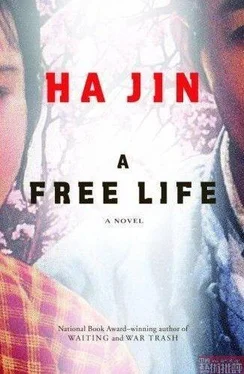Nan said to Shubo, "If China is so sensitive to criticism and public opinion, why doesn't it apologize to its people for the Tiananmen massacre? Compared with the Chinese government, this NBC man is completely innocent. I don't see why people are so furious and even want to have him fired."
"This isn't just politics. It's about national pride," said Shubo. He had come in to watch the games on the TV hung in the corner, which had a larger screen than the one in his home.
"National pride, my butt," Nan said. "What can the Chinese be proud of nowadays? The largest population and cheap labor?"
"Still, that anchorman had no right to condemn China at the opening ceremony."
"How come? Only because he's an American, not entitled to criticize China? I don't understand why the Chinese here also believe that domestic shame mustn't be made public."
"Our athletes were guests of the United States. You can't invite them over and then humiliate them publicly. It's the host's responsibility to make the guests feel welcome.'"
" The reason every country is here is to win medals. Who cares about friendship or politeness or hospitality? That's just Chinese idiosyncrasy and hypocrisy."
"You have a heck of a mouth, Nan. So hard to please."
Shubo held a full-time job in a marble quarry now, so he could no longer always fill in for Nan when his help was needed. Nan found an old chef, Mr. Mu, who was good at Hunan cuisine but didn't have a work permit, so Nan couldn't use this sleepy-eyed man regularly. If the INS caught Mr. Mu working they could fine Nan $5,000. These days Shubo would come in the evenings, mainly to watch TV. Also, he wanted to keep his wife company whenever he could. Pingping often said to Niyan, "I wish Nan were as sticky as Shubo." By "sticky" she meant "attached." Niyan would smile without speaking.
Then one day the same woman who had solicited a donation for the flood victims in China from the Wus four years earlier turned up at the Gold Wok again. Nan remembered her name, Mei Hong. This time she said pleasantly to him while patting his forearm, " Nan Wu, we need you to help feed the Chinese athletes."
"We don't donate anything," he said as his wife stepped closer.
"I'm not asking for donations. We'll pay you for the food. Only because you're a Chinese, we can trust you."
"That's why you came here?" He was nonplussed.
" Yes, the other Chinese restaurants have offered their help too. We dare not get food from foreigners."
"Why can't the athletes eat inside the Olympic Village? There are cafeterias in there. I saw them on TV."
"They can't stand American food-cheese, hamburgers, French fries, sandwiches, hot dogs. Yuck, the stuff makes you heavy and sick."
"How about Tyson chicken? That's as good as any Chinese-style chicken, braised or roasted."
She made no reply, apparently unfamiliar with that brand. What she wanted from the Gold Wok was five helpings of plain rice and shrimp sauteed with vegetables every day for two weeks. She would come toward midday to pick up the food and pay thirty dollars for it. The lunch was only for the athletes who were going to have events in the afternoon, a kind of treat. Nan prepared the rice and the dish as well as he could and was generous with the portions. Mei Hong would come to collect it and then drive all the way to a gas station outside Georgia Tech, since she didn't have a pass for the Olympic Village. A Chinese official would meet her there to receive the food. The Olympics had suddenly activated many local Chinese and united their minds and energies.
Although Nan said they were all being ridiculous, he couldn't help feeling delighted whenever he saw the Chinese national flag rising in the stadium. When he opened a newspaper, he'd check to see how many medals China had won. Sometimes even a Chinese face on TV would attract his attention in a peculiar way, as if he knew that person. He realized that emotionally he couldn't separate himself from those people completely. This realization troubled him, and for days he was cranky. His mind remained confused until he saw a performance on the pommel horse by a stolid-faced man named
Donghua Li, a former Chinese gymnast but a Swiss citizen now. That performance moved Nan and threw him deep into thought. Li had quit China 's national team in order to marry a Swiss woman. He left his native country in 1988, but couldn't compete in international events because he had to wait five years to be naturalized. Now, at age twenty-nine, he was here in Atlanta representing Switzerland alone in gymnastics. While the other athletes loosened up for the pommel horse competition, he was napping in a corner with an opened magazine over his face and with his shoes stacked together as a pillow under his head. Few people took notice of him. Not until it was his turn to perform did he get up from the floor. The commentator joked, "He's woken up finally."
Li performed on the horse with aplomb, keeping his feet pointed while his legs swung high, nimbly executing the scissors movement, as if they had no weight. Then with ease he circled above the horse, keeping his feet together and his legs straight at a right angle to his upper body. He obviously was superior to all the other competitors. Throughout his program, never did his pants touch the horse. Nan watched closely. Despite the lightness of his movement, Li's facial muscles were all knotted, and sweat was glistening on his forehead. Swinging up his legs, he made a flank vault and landed stock-still. Applause burst out all around. He earned 9.875, high enough for the gold. After the event, he blew a kiss to his wife sitting among the audience, but he refused to be interviewed by the Chinese reporters following him. Instead, he turned to shake hands with the leading Russian gymnast, Aleksei Nemov, and gave him a thumbs-up. Nan was eager to see this fellow again in other events and to root for him, but Li never reappeared on the screen.
Another scene, however, troubled Nan. It took place in the women's soccer game between China and the United States. The TV showed several signs bearing Chinese characters being flaunted in the audience. A long horizontal one, held by two men, declared
MARCH FORWARD, MARCH FORWARD! BRAVE SISTERS, YOU MUST
WIN FOR YOUR BROTHERS WHO ARE FULL OF HATRED.
An American woman reporter asked the men what the sign said, but they shook their heads, grinning and pretending they didn't understand her.
Those words were a parody of the beginning of the theme song in the revolutionary ballet The Red Women Detachment. The reporter had some inkling of the message, but she couldn't get the men to level with her. The sign bothered Nan and Pingping; they surmised that the two men had probably failed to find a decent job here or get a green card.
ONE MORNING Mei Hong came and said to Nan, "We need some mung-bean soup. This Atlanta heat is too much for our athletes. Some of them have had sunstroke. We must help them relieve the heat."
"We don't offer mung-bean soup," Nan told her. "No place does. That's why I came to you." " What do you want me to do?"
"Boil a large pot of the soup and I'll personally take it to them."
Nan wanted to ask her how much she'd pay him, but seeing her earnest face filmed with perspiration, he didn't mention money. Mung beans weren't expensive-two pounds, enough for a pot of the soup, cost just over a dollar.
The next morning he boiled the soup in a cauldron and ladled it into a tall stainless-steel pot. Mei Hong came and sealed the lid of the pot with duct tape. Nan helped her load it into the back of her SUV. Having promised to return the pot that very day, she drove away.
Pingping disliked Mei Hong, saying that she was like a village leader or a Party secretary of a small work unit. "She acts as if she runs our life," Pingping complained.
Читать дальше












